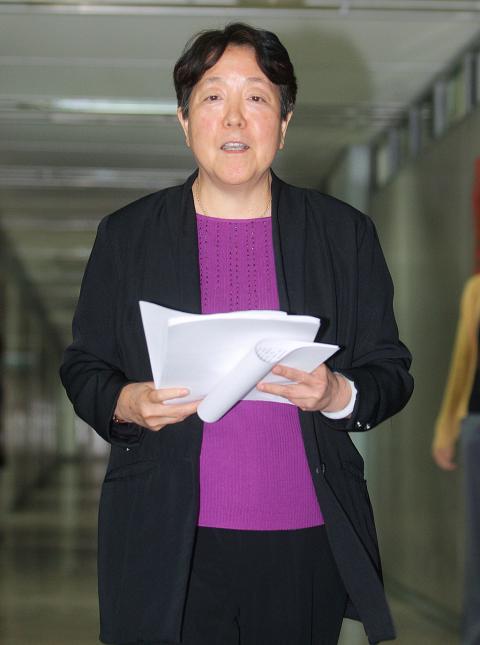Former New Party legislator Hsieh Chi-ta (謝啟大), whose employment by the Taipei City Government, allegedly to help her meet pension requirements, triggered a controversy, yesterday said she had resigned.
Hsieh made the announcement after Taipei Mayor Hau Lung-bin (郝龍斌) reproached her for traveling to China to appear on a Chinese TV talk show where she criticized the recent Sunflower movement protests at the Legislative Yuan and elsewhere in Taiwan.
Her appearance was reported in local media on Wednesday.

Photo: CNA
“I have officially tendered my resignation to Mayor Hau and hereby announce that I will not receive any pension. I will not tolerate media and politicians’ attacks on my integrity,” she told a press conference, which lasted only 30 seconds.
Last week, Taipei City councilors raised questions about the hiring of Hsieh in July last year and her promotion to senior specialist in the city government’s secretariat ahead of her 65th birthday, when she would qualify for a civil service pension because she had 22 years of civil service work before she moved to China for 10 years.
They also criticized her exemption from having to clock in and out, and from being graded according to civil servant employment standards — possible violations of the Civil Service Act (公務員服務法) — and questioned both her involvement in a lawsuit as a volunteer defense attorney and whether she also held People’s Republic of China citizenship.
Neither the Taipei City Government nor Hsieh responded to the questions, although related investigations are still ongoing.
Hsieh yesterday said that she decided to quit because she “cherished [her] reputation and dignity more than a pension.”
During the talk show, Hsieh said: “It is not true that ‘the people’ are always right.”
“Look at the recent occupation of the Legislative Yuan. Was it right? Absolutely not. There was someone behind the scenes using [the Sunflower movement],” she said.
Hau on Wednesday said her remarks were very inappropriate for a civil servant.
The mayor yesterday said Hsieh’s trip to China and appearance on the TV show had not been officially reported or approved.
“I would say this was one of the determining factors in her resignation,” he said.
In related news, former Chinese Nationalist Party (KMT) legislator Chiu Yi’s (邱毅) remarks on a Chinese political talk show during the Sunflower movement’s occupation of the legislature were criticized by Democratic Progressive Party (DPP) Legislator Tuan Yi-kang (段宜康) at a meeting of the legislature’s Interior Committee yesterday.
Tuan questioned the appropriateness of Chiu, who is a board member of state-run CPC Corp, Taiwan (台灣中油), appearing on a Chinese talk show, where he claimed the Sunflower movement was a plot by the DPP.
Tuan said Chiu had also insulted the Legislative Yuan by referring to it as “a legislative body.”
The Chinese government censors the use of “Legislative Yuan” in connection with Taiwan because it connotes a national-level institution.

Intelligence agents have recorded 510,000 instances of “controversial information” being spread online by the Chinese Communist Party (CCP) so far this year, the National Security Bureau (NSB) said in a report yesterday, as it warned of artificial intelligence (AI) being employed to generate destabilizing misinformation. The bureau submitted a written report to the Legislative Yuan in preparation for National Security Bureau Director-General Tsai Ming-yen’s (蔡明彥) appearance before the Foreign Affairs and National Defense Committee today. The CCP has been using cognitive warfare to divide Taiwanese society by commenting on controversial issues such as Taiwan Semiconductor Manufacturing Co’s (TSMC, 台積電) investments in the

INVESTIGATION: The case is the latest instance of a DPP figure being implicated in an espionage network accused of allegedly leaking information to Chinese intelligence Democratic Progressive Party (DPP) member Ho Jen-chieh (何仁傑) was detained and held incommunicado yesterday on suspicion of spying for China during his tenure as assistant to then-minister of foreign affairs Joseph Wu (吳釗燮). The Taipei District Prosecutors’ Office said Ho was implicated during its investigation into alleged spying activities by former Presidential Office consultant Wu Shang-yu (吳尚雨). Prosecutors said there is reason to believe Ho breached the National Security Act (國家安全法) by leaking classified Ministry of Foreign Affairs information to Chinese intelligence. Following interrogation, prosecutors petitioned the Taipei District Court to detain Ho, citing concerns over potential collusion or tampering of evidence. The

‘COMPREHENSIVE PLAN’: Lin Chia-lung said that the government was ready to talk about a variety of issues, including investment in and purchases from the US The National Stabilization Fund (NSF) yesterday announced that it would step in to staunch stock market losses for the ninth time in the nation’s history. An NSF board meeting, originally scheduled for Monday next week, was moved to yesterday after stocks plummeted in the wake of US President Donald Trump’s announcement of 32 percent tariffs on Taiwan on Wednesday last week. Board members voted to support the stock market with the NT$500 billion (US$15.15 billion) fund, with injections of funds to begin as soon as today. The NSF in 2000 injected NT$120 billion to stabilize stocks, the most ever. The lowest amount it

NEGOTIATIONS: Taiwan has good relations with Washington and the outlook for the negotiations looks promising, Minister of Economic Affairs J.W. Kuo said Taiwan’s GDP growth this year is expected to decrease by 0.43 to 1.61 percentage points due to the effects of US tariffs, National Development Council (NDC) Minister Paul Liu (劉鏡清) said at a meeting of the legislature’s Economics Committee in Taipei yesterday, citing a preliminary estimate by a private research institution. Taiwan’s economy would be significantly affected by the 32 percent “reciprocal” tariffs slapped by the US, which took effect yesterday, Liu said, adding that GDP growth could fall below 3 percent and potentially even dip below 2 percent to 1.53 percent this year. The council has commissioned another institution